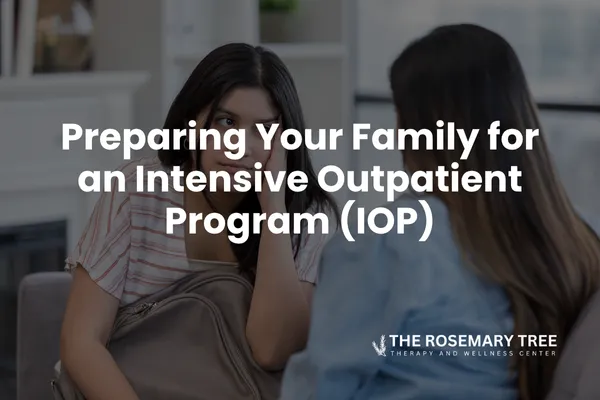
Preparing Your Family for an Intensive Outpatient Program (IOP)
Introduction: Why Preparation Matters
Enrolling your teen in an Intensive Outpatient Program (IOP) is a courageous step toward healing. It shows you’re committed to providing structured support without uprooting daily life. But transitioning into an IOP requires adjustments—not just for your teen, but for the entire family. Preparing ahead of time can ease anxiety, promote consistency, and set the stage for success. Here’s how to get ready.
Talk Openly With Your Teen
Start by having an honest conversation with your child about what to expect. Explain that an IOP combines group sessions, individual therapy, and skill-building activities several afternoons a week. Reassure your teen that therapy is a safe space where confidentiality is respected and everyone is working toward similar goals. Validate any worries they may have and emphasize that asking for help is a sign of strength.
Coordinate With School and Teachers
Since most adolescent IOPs meet after school hours—often three days a week for roughly 8.5 hours total—it may impact your teen’s schoolwork. Reach out to teachers or school counselors to let them know your child will be attending therapy. Ask about assignments, potential accommodations, or ways to catch up on missed class time. Some programs provide documentation or notes to support attendance, which you can share with school administrators. Planning ahead ensures your teen stays on track academically while focusing on their mental health.
Adjust Family Schedules and Logistics
IOP sessions typically run on set days and times, such as Monday and Tuesday from 3:30 to 6:30 PM and Thursday from 3:30 to 6 PM. Review your family calendar and make the necessary adjustments for drop-offs, pick-ups, dinner, and homework. Plan reliable transportation—teens may need a ride to and from the program location. If you have other children, arrange childcare or carpools so you can focus on supporting your teen. Keeping logistics smooth reduces stress and helps your child attend consistently.
Understand and Embrace Family Involvement
Family participation is a cornerstone of effective adolescent treatment. Many IOPs invite parents to join weekly sessions, alternating between parent-only skills groups and family sessions where everyone attends together. Commit to these meetings—block off Tuesday evenings or whatever times your program specifies. Use these sessions to learn about the skills your teen is practicing, ask questions, and work through family dynamics. Recognize that your own growth and involvement are key to your child’s progress.
Gather Information for Intake
Before your teen starts an IOP, there will likely be an intake session where therapists gather a comprehensive history and set treatment goals. Prepare by collecting information about your child’s medical, developmental, and mental health history. Note any medications, prior therapies, or significant life events. Think about your family’s strengths and challenges so you can communicate them clearly. This helps clinicians tailor the program to your teen’s unique needs.
Prepare Your Home Environment
An IOP is not just about what happens during sessions—it’s also about integrating skills into daily life. Create a supportive home environment by encouraging open communication and practicing new skills together. For example, if your teen is learning mindfulness or emotion regulation techniques, practice those exercises as a family. Designate a quiet space for homework and reflection. Maintain routines around meals and sleep to provide stability. Celebrate small victories and remain patient during setbacks.
Plan for Self‑Care and Support
Supporting your child’s mental health journey can be emotionally demanding. Prioritize your own self‑care so you can be fully present. Attend parent support groups if your IOP offers them. Consider individual counseling to process your feelings and learn effective ways to support your teen. Reach out to friends, family, or support networks for help with meals, transportation, or childcare. Your well‑being is essential for sustaining your family through treatment.
Communicate With Siblings and Loved Ones
If you have other children, prepare them for the changes ahead. Explain that their sibling will be attending an intensive program to feel better and that everyone can help by being supportive and understanding. Encourage siblings to share their feelings and ask questions. If extended family members are involved in childcare or transportation, keep them informed about the schedule and your teen’s needs.
Conclusion: Set the Stage for Healing
Preparing for an Intensive Outpatient Program is an act of love and commitment. By organizing logistics, coordinating with schools, embracing family involvement, and fostering a supportive home environment, you set your teen up for a positive experience. Remember, you’re not alone—therapists, support groups, and your community are all here to help. With thoughtful preparation, your family can approach the IOP journey with confidence and hope.


